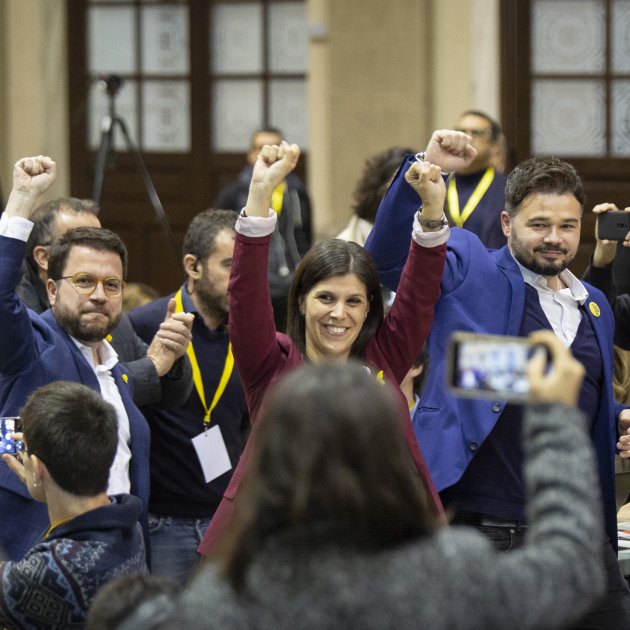Aware of the complexity of the wording of the question they've asked their membership this Monday, ERC party leaders have spent the last few hours trying to clarify it. From 9 in the morning to 8 this evening, 8,500 party members (in other words, all members except the thousand without a listed email address) are invited to take part in an online consultation on returning Pedro Sánchez as prime minister of Spain. The exact question reads: "Do you agree with rejecting Pedro Sánchez's investiture if beforehand there is no agreement to tackle the political conflict with the [Spanish] state through a negotiating table?".
This negotiating table, Catalan vice-president Pere Aragonès has said, has to be between government, without red lines and with a specific timetable and guarantees. "If they don't move, any agreement is impossible", ERC warn Sánchez's party, PSOE. What's more, they add that "we have more than enough reasons to vote no".
By 12 noon, turnout was already at 40%. The aim of the vote, ERC leaders have told El Nacional, is to win the support of their members to pressure PSOE and make it clear that "if they don't move, there will be no investiture". They also want, however, to preserve their leeway to be able to direct and determine the negotiations. As such, the result won't be binding.
ERC's final position on the investiture will be decided by its national council. In the words today of their deputy secretary general, Marta Vilalta, members "are deciding that if PSOE doesn't move, ERC's vote will be no". Junqueras's party feel strong enough to squeeze Sánchez and make it clear that if the acting prime minister doesn't get a progressive government invested first try, it's most likely that his own party will end up sacrificing him and try for an agreement with PP.
Both parties have already designated three representatives (Gabriel Rufián, Marta Vilalta and Josep Maria Jové for ERC; Adriana Lastra, Carmen Calvo and Salvador Illa for PSOE) who will sit down this week with the aim of reaching an agreement to the satisfaction of both sides.
Two of the members of ERC's team are deputies in the Catalan Parliament which is in session on Tuesday and Wednesday. As such, party sources say that, unless the PSOE leaders come to Barcelona, their first official meeting will come in the second half of the week.
"We're laying the groundwork, forging a path for realise the negotiating table between governments; we're using the strength we've been given by the ballot boxes to generate this scenario of dialogue," said Vilalta. She added that the idea is "to put our deputies at the service of the 'sit and talk'". The party emphasise that they don't want an "ERC negotiating table", that their aim is to "construct a country negotiating table".
On that point, they restate their intention to continue with their contacts with their partners in the Catalan government, JxCat, to try to "find a common position". Whilst in public they argue that PSOE can't be allowed to veto president Torra as a conversation partner, ERC admits in private that "they don't want him as a negotiator".
The requirements
In party headquarters on Barcelona's carrer Calàbria, they expect no surprises in the final result, which will be announced later this evening. They believe the majority of their supporters will back the position party leadership has argued for publicly, namely voting 'no' to investing Sánchez should there not be a negotiation table.
Looking ahead to these negotiations, senior party members say there are four essential elements:
- The dialogue has to be between governments, not between parties as PSOE suggested a few days ago. In recent hours, various PSOE leaders have said this shouldn't be an obstacle.
- The dialogue has to be without conditions. That means that the Catalan side can make its proposals for self-determination and an amnesty for the political prisoners.
- There needs to be a specific timetable so it doesn't drag on indefinitely.
- There need to be guarantees that everything agreed on will be implemented.
